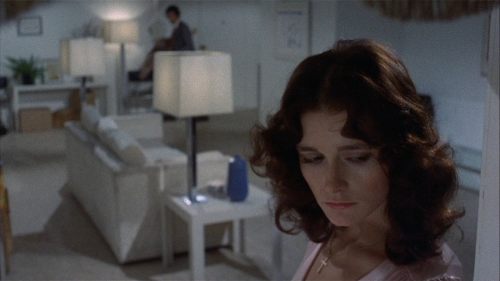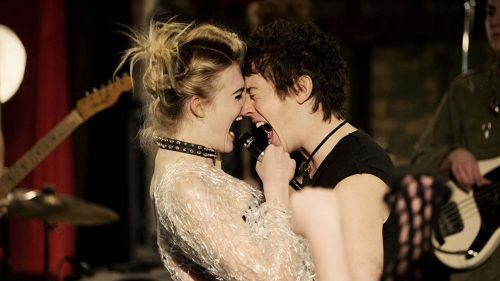HEDWIG AND THE ANGRY INCH Shines Like The Brightest Star
I’ve seen Hedwig and the Angry Inch on stage ten times.
Granted, that came through making the video projections for the show's New Zealand premiere, but by the time it opened, I no longer needed to attend performances. I was just so taken with the character, story, and songs John Cameron Mitchell and Stephen Trask had created - and the raw open heart beating at its centre - that I couldn’t stay away. I laughed and cried anew each time, an emotional wreck at every inevitably-standing ovation. Incredibly, I only saw Mitchell’s 2001 film adaptation this week, thanks to a brand-new gorgeous Blu-ray by the Criterion Collection. Turns out: the film lacks none of the show's power, but it deploys it in rather different ways.
Hedwig and the Angry Inch is an unusual stage musical, put together (as illustrated on the Blu-Ray) through a lengthy process of performance and workshopping. Presented as a one-night-only show in whatever venue it occupies at the time, it opens as a concert by the titular punk-rock band, before turning into a stand-up comedy routine, then a heartfelt autobiographical monologue, concluding with an uninterrupted run of songs - and taking the audience on a wild emotional ride. The show is heavy on improvisation and audience interaction, requiring immense skill on the part of the lead actor, who is almost the sole focus from start to finish. It’s also a personal story about a genderqueer punk-rock singer, filtered through themes drawn from classical and Biblical mythology. There's a lot going on there.
Adapting to the screen any show so specifically theatrical would be a serious challenge, but Mitchell accomplished it through physicalising Hedwig’s monologue to the audience. Obviously, the film is packed with flashbacks, and several musical numbers break out into fantastic abstraction, through transforming sets and animation - but neither approach can form the entirety of the film. So Mitchell leans on the Angry Inch's fictional tour through a chain of family restaurants, using that picture of middle-America as his visual mileu. Much of the movie is set in “Bilgewater’s” across America, Hedwig interacting with sad suburban clientele much as she would the audience of a stage production. It’s a smart way to simulate the audience experience, taken to an intentionally uncomfortable extreme.
The movie brought Hedwig’s story to a much wider audience, growing even broader as it spread onto video. For a movie that's all about understanding and acceptance - of others and of one's self - that's important. Very few of us can claim a life experience that overlaps with Hedwig’s in any meaningful way. Hers is a unique story, beginning in communist East Germany before migrating to the American Midwest and swerving through love, despair, a taste of superstardom, bitterness, and acceptance. Her gender - the titular “angry inch” a result of a sex-change operation gone wrong - is shared by no-one; Hedwig is othered, in one way or another, to everyone. But through his sparkling, sardonic performance, his filmmaking, and his and Trask's writing, Mitchell finds the universality in that specificity.
A major thematic throughline concerns "The Origin Of Love" - a song in the musical, and a story from Plato's Symposium. The story goes like this: long ago, human beings looked like two people attached at the back, and in these pairings there were three sexes - male/male, female/female, and male/female. As payback for plotting to overthrow the gods, Zeus split those creatures in half, leaving what we today consider to be human beings. Thereafter, they were forever doomed to roam the earth looking for their missing half - be it man or woman - making love as an attempt to force themselves back together again.
While the story itself is fanciful, and is arguably a satire of creation myths, the central idea - that we are incomplete, and that we seek out love in order to heal a cosmic wound - is taken seriously in Hedwig. In the abstract, it's surely intimately familiar to many. We all spend our lives seeking our other half, whether that be another person, a group of people, or something that comes from within. This idea is woven throughout the script(s) in writing both poetry and vernacular, eventually building to an emotionally overwhelming conclusion.
Hedwig herself goes through several potential “other halves,” but the truest seems to be Tommy Gnosis, the Christian rockstar who learned everything from her - and then took it all away. Hedwig's monologue rarely strays too far from the subject, and in the film her tour explicitly shadows his. As he rockets to stardom, she languishes in Bilgewater’s, simultaneously furious and longing. They come from implausibly different backgrounds, yet they seem to click whenever they’re together. Indeed, as the story reaches its climax, Hedwig and Tommy seem to merge into one being.
One aspect of the stage musical largely dropped from the film is the character arc of Hedwig's long-suffering husband and backup singer Yitzhak (played in all versions by female actors). In the film, Yitzhak seeks solace from Hedwig's cold treatment from a cruise-ship production of Rent, but it’s never quite explained why this tension exists. In the stage show, though - and in a deleted scene on the Blu-ray - we learn of the origins of this relationship: Hedwig agrees to marry Yitzhak and take him away from his dead-end drag-queen life - on the condition that he never wear a wig again. Hedwig knows full well the pain of being denied one's identity. She's has been hurt by this before, so she hurts Yitzhak in the same way. It’s a pattern seen everywhere, and it comes to a head on stage in Yitzhak’s single solo number “The Long Grift” - the song Tommy is seen practicing in the movie - in which the backup singer supplants the lead for one glorious moment.
The film also minimises the resolution of this relationship. In the film, during the tear-jerker finale “Midnight Radio,” Hedwig hands Yitzhak a wig, and for a moment we follow Yitzhak as he crowdsurfs out of the venue, suddenly in full drag - but the attention turns almost immediately back to Hedwig. The show does things differently. Yitzhak returns at the song’s climax, belting out the final lines of the song as Hedwig exits. The final moments of the show belong to Yitzhak, emerged from his cocoon, freed from Hedwig’s bondage as Hedwig is freed from her own. It’s an important mirror to Hedwig’s own resolution of identity, and if I had to criticise the film on one point, it's this.
Hedwig and the Angry Inch is a powerful story about identity and creation and pain and love. It’s a plea for understanding from a character who fits under the LGBTQ umbrella, but not precisely into any subcategory therein. And just as much as either of those things, it’s a fucking hilarious, kickass punk-rock musical that still, after over twenty years in existence, feels like a middle finger and a warm embrace all at once. It’s a miracle, I love it, and you will too.



